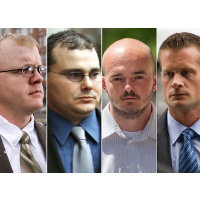Court Throws Out Blackwater Guards’ Sentences for 2007 Baghdad Massacre
Three former mercenaries who killed and injured 31 unarmed Iraqis in Nisour Square will be resentenced, and a fourth may be retried

A federal appeals court on Friday threw out lengthy prison sentences of three former operatives for private mercenary firm Blackwater Worldwide—and ordered a retrial for a fourth operative who had received a life sentence—for their roles in the notorious 2007 Nisour Square massacre in Baghdad, which left 14 unarmed Iraqis dead and another 17 wounded.
“The men, Dustin Heard, Evan Liberty, Paul Slough, and Nicholas Slatten, were convicted in October 2014 after years of legal battles,” Common Dreams reported in 2015, when U.S. District Judge Royce Lamberth sentenced Slatten—who the government says fired the first shots—to life in prison and the other three men to “30 years and one day each on charges that included manslaughter, attempted manslaughter and using firearms while committing a felony.”
During the 10-week trial in 2014,
“prosecutors said the four defendants, among 19 Blackwater guards providing security for State Department officials in Iraq, fired machine guns and grenade launchers in a reckless and out-of-control way after one of them falsely claimed their convoy, called Raven 23, was threatened by a car bomber,” the Washington Post reported.
“While defense lawyers have argued that the men were acting in self-defense, federal prosecutors wrote that the men’s ‘crimes here were so horrendous—the massacre and maiming of innocents so heinous—that they outweigh any factors that the defendants may argue form a basis for leniency,'” Common Dreams reported.
The federal appeals court, in a split decision issued Friday, claimed prosecutors misapplied a law during the lower court’s trial, the New York Times reported:
The three-judge panel declared the contractors’ sentences “grossly disproportionate to their culpability for using government-issued weapons in a war zone.” The court ordered the three men to be resentenced, a initial ruling that could significantly reduce their prison terms.
Mr. Slatten’s conviction was thrown out entirely. The appeals court ruled that he never should have been prosecuted in the same trial as his colleagues, one of whom said he—and not Mr. Slatten—fired the first shots.
By overturning his conviction, the court has forced the Justice Department to decide whether to prosecute again….Retrying Mr. Slatten will not be easy. Prosecutors tracked down dozens of Iraqi witnesses and flew them to Washington for the first trial and would probably have to do so again.
According to the Post, spokesmen for the U.S. Justice Department and U.S. Attorney Channing D. Phillips said Phillips’s office “is reviewing the opinion and has no further comment at this time.”
Paul Dickinson, an attorney who represented the families of six Iraqi massacre victims—including 9-year-old Ali Kinani, who was shot in the back of the head—shared their stories in a long series of tweets on Friday afternoon.
Blackwater murder conviction thrown out, other sentences overturned. I represented 6 victims of these crimes. 1/ https://t.co/gs2I5kHLfS
— Paul Dickinson (@prdickinson) August 4, 2017
The Nisour Square shooting & Ali Kinani's story is explained in this excellent video documentary by @jeremyscahill. https://t.co/6lkbc0Nsry
— Paul Dickinson (@prdickinson) August 4, 2017
Some of Dickinson’s messages were retweeted by journalist Jeremy Scahill, who authored the book Blackwater: The Rise of the World’s Most Powerful Mercenary Army. In a piece for The Intercept following the 2014 conviction, Scahill welcomed the ruling, but also outlined the greater issues with U.S. military contractors, particularly Blackwater and its infamous former CEO, Erik Prince. Scahill wrote:
The incident for which the men were tried was the single largest known massacre of Iraqi civilians at the hands of private U.S. security contractors. Known as “Baghdad’s bloody Sunday,” operatives from Blackwater gunned down 17 Iraqi civilians at a crowded intersection at Nisour Square on September 16, 2007. The company, founded by secretive right-wing Christian supremacist Erik Prince…had deep ties to the Bush administration and served as a sort of neoconservative Praetorian Guard for a borderless war launched in the immediate aftermath of 9/11….
Just as with the systematic torture at Abu Ghraib, it is only the low level foot-soldiers of Blackwater that are being held accountable. Prince and other top Blackwater executives continue to reap profits from the mercenary and private intelligence industries.
More recently, the Blackwater founder—who is also the brother the Education Secretary Betsy Devos—has been tied to the Trump administration. In April, as Common Dreams reported, government officials told members of the press that Prince “took part in a clandestine meeting with a confidant of Russian President Vladimir Putin as part of an apparent effort to establish a back-channel line of communication’ between Moscow and the White House.”
In June, Prince penned a Wall Street Journal op-ed in which he outlined five ways he believes U.S. President Donald Trump‘s can “fix our approach in Afghanistan,” including the suggestion that the U.S. deploy an “East India Company approach.” As Common Dreams reported, one critic described Prince’s plan as “sheer 19th century bloodlust and thirst for empire,” and another noted, it is hardly surprising that a “war profiteer sees profit opportunity in war.”
Following the op-ed, it was revealed that two of Trump’s top aides, White House chief strategist Steve Bannon and senior adviser Jared Kushner, reportedly solicited advice from Prince “on how to proceed with the 16-year-long war in Afghanistan.”
This work is licensed under a Creative Commons Attribution-Share Alike 3.0 License

